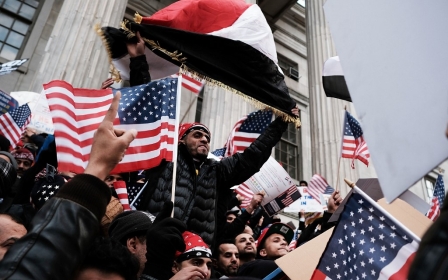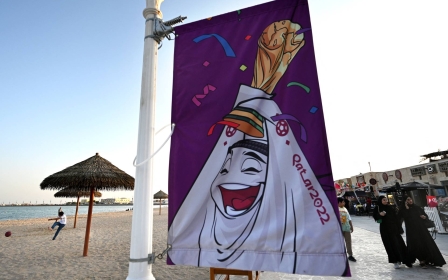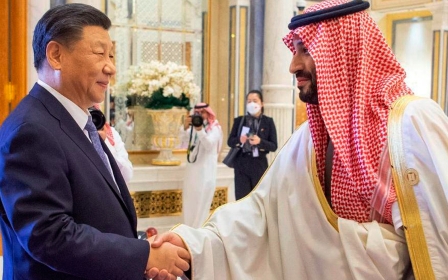US: Pakistani women take to streets to demand temporary protected status
Dozens of Pakistani women took over the Dag Hammarskjold Plaza, just two blocks away from the United Nations headquarters in New York City, to demand temporary protected status for undocumented Pakistanis living in the US.
"Raise your voices as if you are yelling at your parosi [neighbours in Urdu]," said Erum Hanif, chief executive officer at Apna Brooklyn Community Center, as she encouraged the women in the crowd on Thursday.
Women stood bracing the cold wind with their dupattas (shawls) and their shalwar kameez - ethnic clothing. They held signs both in English and Urdu demanding temporary protected status (TPS) for themselves and their loved ones.
They called out to Pakistan's Foreign Minister Bilawal Bhutto Zardari, who is in New York City attending the UN Security Council debates.
'We are here but we did not forget our country'
- Erum Hanif, Apna Brooklyn Community Center
Temporary protected status is humanitarian protection offered to both countries and people from those countries living in the US. Once TPS is designated, people from that country cannot be deported, they can obtain employment documents, and can be granted travel authorisation to go back home and visit.
New MEE newsletter: Jerusalem Dispatch
Sign up to get the latest insights and analysis on Israel-Palestine, alongside Turkey Unpacked and other MEE newsletters
Without this status, over 63,000 undocumented Pakistanis in the US are not protected, organisations say.
The secretary of homeland security may designate a country for TPS if there is an ongoing armed conflict in the country, an environmental disaster, an epidemic, or other "extraordinary" conditions.
The status has been granted to several groups of people in the US, including those from Afghanistan, Somalia, Sudan, Syria and Yemen.
Protesters argued that Pakistan is more than eligible for TPS status after the devastating floods in 2022 that killed at least 1,600 people, displaced 7.9 million people, and impacted more than 30 million - roughly equal to one in seven Pakistanis.
Middle East Eye reached out to US Citizenship and Immigration Services (USCIS), which handles TPS status, for comment on this story, but they did not respond by the time of publication.
In November 2022, the New York-based Desis Rising Up and Moving (Drum) created a petition demanding both TPS and special student status for Pakistanis. In December, Drum met with Zardari, urging him to request TPS for Pakistan. According to Drum, he did not give a detailed response but said he would look into the matter.
"TPS... is a lifesaving, blanket protection that allows people from a designated country to remain in the US while conditions in their home country make a safe return impossible," Drum said in its petition.
"A designation of TPS and SSR would allow Pakistani immigrants, including students, the ability to work in the US and provide relief to their families back home while bolstering the larger economy.”
Help to bolster Pakistan's economy
According to Hanif, Pakistanis living in the US send money back home and are contributing to Pakistan's economy. The least Pakistan could do for its nationals is request TPS and the US should grant it, she said.
"We are here, but we did not forget our country. We did not forget our country's poor people," she said. "I can 100 percent assure you that each one of us standing here one way or another is sending money back home to support our family members or neighbours or relatives, our poor villagers, whether it's about providing food, shelter, clothing, or health care facilities."
Abeera Aijaz came to the US with her single mother when she was 13 years old. For eight years, her mother waited to get her documents so she could go back home to Pakistan to visit her family. She would cry whenever there was a wedding that she could not go to. She survived through FaceTime, Aijaz said.
But eight years later, her mother died before she could get her legal documents.
"There are so many other men and women like my mother, who could not get their documents and who could not say goodbye to their families," she said.
"She could not visit her parent's grave. Maybe other people will run out of time before they can go visit their family back home, too. It is important that we amplify their voices, we become their voices, and we make this happen together."
Middle East Eye delivers independent and unrivalled coverage and analysis of the Middle East, North Africa and beyond. To learn more about republishing this content and the associated fees, please fill out this form. More about MEE can be found here.




